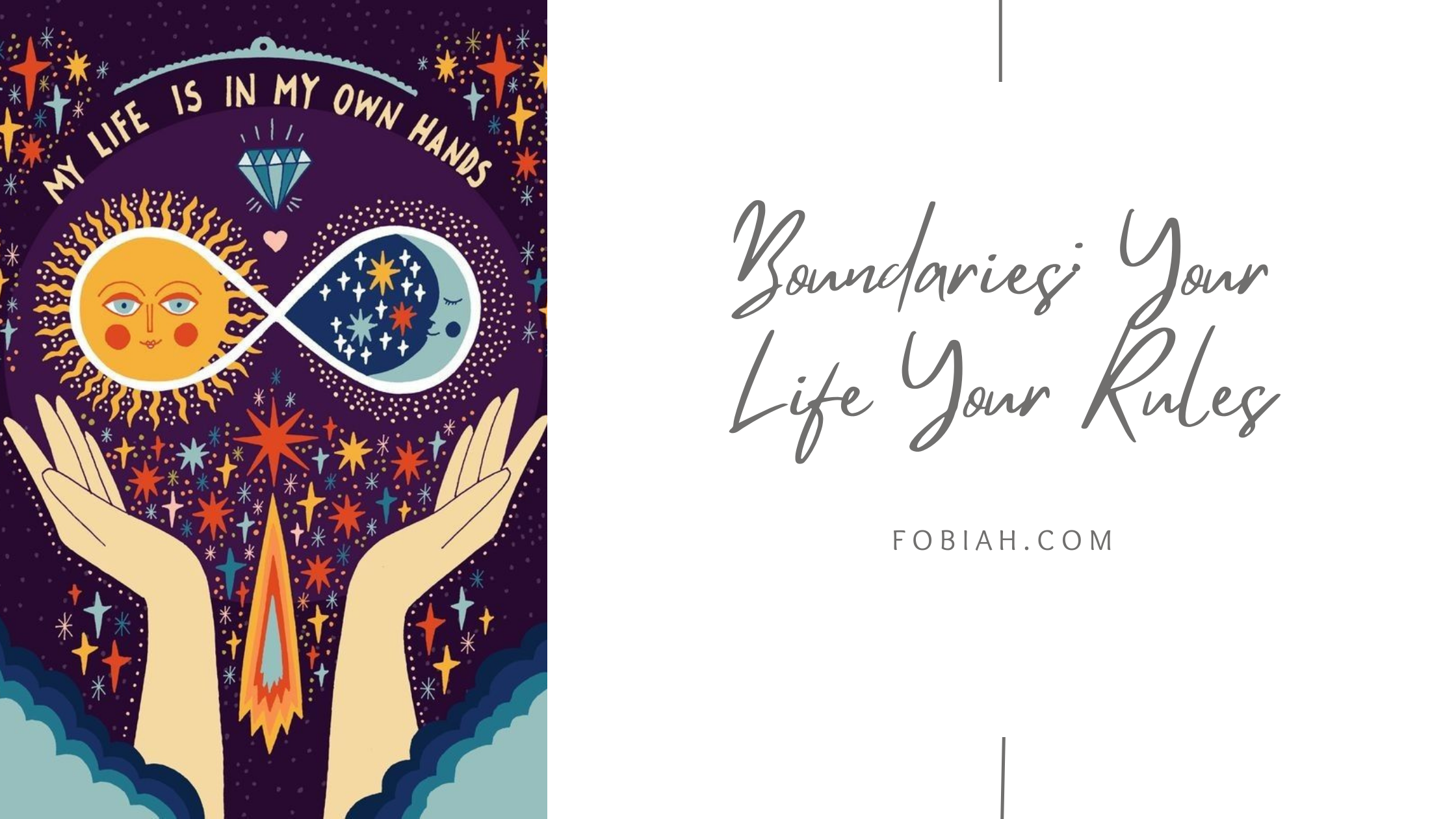In today’s fast-paced, interconnected world, personal boundaries have become more critical than ever. Boundaries define the limits we set to protect our mental, emotional, and physical well-being. They allow us to maintain healthy relationships with ourselves and others by setting clear expectations of how we wish to be treated. Setting and respecting boundaries fosters mutual respect, better communication, and personal growth.
In this blog, we’ll explore the concept of boundaries, why they are important, and how setting healthy boundaries can change our lives for the better.
What are Boundaries?
Boundaries are guidelines, rules, or limits that individuals create to identify acceptable and unacceptable behavior from others. These boundaries can be physical, emotional, mental, or even digital. They act as a filter to safeguard your personal space, energy, and resources. Think of boundaries as a form of self-respect and self-protection, where you assertively communicate what’s right for you.
Common types of boundaries include:
- Physical Boundaries: Pertaining to personal space, privacy, and physical needs.
- Emotional Boundaries: Relating to feelings, self-worth, and emotional energy.
- Time Boundaries: Ensuring your time is respected and used wisely.
- Material Boundaries: Related to personal possessions and financial resources.
- Mental Boundaries: Referring to your thoughts, opinions, and beliefs.
Each type serves a purpose in creating harmony and balance in various aspects of life.
Why Are Boundaries Important?
Boundaries play a fundamental role in safeguarding your well-being and promoting healthy interactions with others. Without them, people may take advantage of you, leading to burnout, resentment, and feelings of being overwhelmed.
Some of the key reasons why boundaries are important include:
- Preserving Mental and Emotional Health: Boundaries protect your mental space and prevent others from imposing their negativity or unrealistic expectations on you.
- Enhancing Relationships: Clearly defined boundaries improve relationships by ensuring both parties know and respect each other’s needs and limits.
- Promoting Self-Respect: Setting boundaries is an act of self-respect and self-love. It reinforces your self-worth and makes it clear to others how you wish to be treated.
- Fostering Independence: Healthy boundaries help you maintain autonomy and prevent unhealthy codependency in relationships.
- Avoiding Burnout: Without boundaries, people may overextend themselves, which can lead to burnout and fatigue. Setting limits helps you conserve your energy and time.
Benefits of Setting Boundaries
Establishing boundaries leads to numerous benefits, both for your personal life and in your relationships. Some of the key benefits include:
- Improved Self-Awareness: When you reflect on your boundaries, you develop a deeper understanding of your needs and limits, leading to better self-awareness.
- Reduced Stress and Anxiety: Boundaries act as a buffer against overwhelming situations and people, reducing stress and anxiety.
- Healthier Relationships: Boundaries allow for open, honest communication, promoting trust and mutual respect in relationships.
- Increased Confidence and Assertiveness: When you set and maintain boundaries, you practice self-assertion, which boosts confidence and assertiveness in everyday interactions.
- Clearer Focus and Productivity: By creating boundaries around your time and energy, you’re able to prioritize tasks and people who align with your values and goals.
- Enhanced Emotional Stability: With proper emotional boundaries, you can avoid being swayed by others’ emotional outbursts or negative energy, fostering emotional stability.
Examples of Setting Boundaries
Boundaries can be set in every facet of life. Here are some examples:
- At Work: Telling a colleague you’re not available for a non-urgent task outside working hours.
- In Relationships: Letting a partner know when you need alone time to recharge.
- With Friends: Politely declining an invitation because you need a break, without feeling guilty.
- With Family: Asking family members to respect your privacy by knocking before entering your room.
- Online: Limiting how much time you spend on social media or setting rules around sharing personal information.
These examples reflect how boundaries can be tailored to different situations, allowing you to maintain balance and protect your peace of mind.
What Can We Set Boundaries Around?
You can set boundaries around any area of your life that impacts your well-being. Common areas include:
- Time: Deciding how much time you allocate to work, social activities, and self-care.
- Communication: Establishing how often and in what manner you communicate with others, such as limiting late-night work calls or personal texts.
- Personal Space: Protecting your physical and emotional space, such as deciding who can enter your home or when you need alone time.
- Workload: Setting limits on your professional responsibilities to avoid taking on too much at work.
- Emotional Labor: Establishing limits on how much emotional support you offer others, especially when it’s draining.
Each boundary serves to create a healthy balance between giving and receiving while protecting your overall well-being.
How Do We Set Healthy Boundaries?
Setting healthy boundaries requires introspection, assertiveness, and effective communication. Here are steps to help you set boundaries successfully:
- Identify Your Limits: Reflect on areas in your life where you feel overwhelmed or disrespected. This will help you identify the boundaries you need to set.
- Communicate Clearly: Once you’ve identified your boundaries, communicate them assertively and clearly to others. Be honest, but kind.
- Be Consistent: Consistency is key. Once you set a boundary, make sure to enforce it regularly. Inconsistent boundaries can confuse others and undermine your efforts.
- Be Open to Adjustments: Some boundaries may evolve over time. Stay open to making adjustments as your needs change.
- Use “I” Statements: When setting boundaries, frame them in terms of your own needs using “I” statements. For example, “I need some quiet time after work to recharge” rather than “You’re always bothering me when I get home.”
- Practice Self-Care: Setting boundaries is an ongoing process that requires self-care and patience. Ensure you’re practicing self-compassion as you establish your limits.
Signs of Healthy Boundaries
Healthy boundaries are evident in your daily interactions and relationships. Signs include:
- Respect for Personal Space: People around you respect your physical and emotional space.
- Balanced Relationships: Your relationships feel reciprocal, where both parties give and receive support equally.
- Ability to Say “No”: You’re able to say “no” without feeling guilty, and others respect your decision.
- Reduced Guilt: You no longer feel the need to overextend yourself or sacrifice your needs to please others.
- Better Emotional Regulation: You can regulate your emotions better because you’re not overwhelmed by others’ demands or negativity.
Healthy boundaries are reflected in your ability to maintain a sense of self while engaging with others.
What if We Don’t Have Healthy Boundaries?
A lack of boundaries can lead to several negative outcomes, such as:
- Emotional Exhaustion: Without boundaries, you may take on too much responsibility, leading to emotional exhaustion and burnout.
- Resentment: Over time, you may develop resentment toward those who constantly violate your boundaries, even unintentionally.
- Loss of Identity: In relationships where boundaries are blurred, it’s easy to lose sight of your own needs, values, and identity.
- Co-dependency: Without boundaries, relationships can become co-dependent, where one person sacrifices their needs for the other, leading to an unhealthy dynamic.
- Increased Anxiety: A lack of boundaries can create chronic stress and anxiety as you struggle to manage others’ expectations and demands.
How to Respect Others’ Boundaries
Just as important as setting boundaries is learning to respect the boundaries of others. Here’s how:
- Listen Carefully: Pay attention when someone sets a boundary and honor their request.
- Don’t Take it Personally: Remember that when someone sets a boundary, it’s not a personal rejection but an act of self-care.
- Communicate Openly: If you’re unsure of someone’s boundaries, ask for clarification to avoid misunderstandings.
- Be Empathetic: Try to understand why the person has set a particular boundary and respect their needs, even if you don’t fully agree.
Maintaining Boundaries in Difficult Situations
There will be times when maintaining boundaries is difficult, especially with loved ones or in the workplace. Here’s how you can stand firm:
- Reinforce Your Boundaries: Politely, but firmly, remind others of your boundaries when they try to overstep.
- Seek Support: Surround yourself with people who respect and support your boundaries. If necessary, seek professional help from a therapist.
- Let Go of Toxic Relationships: If someone consistently violates your boundaries and shows no willingness to respect them, consider distancing yourself from that person.
Conclusion
Boundaries are essential for creating a life where you feel respected, valued, and balanced. They foster healthier relationships, reduce stress, and allow you to maintain your autonomy. Learning to set and maintain healthy boundaries is an act of self-care that everyone deserves.
Ultimately, setting boundaries empowers you to live authentically, with respect for your needs and the needs of others. If you’re still navigating this journey, remember it takes time and practice. Start small, be patient with yourself, and watch your life transform as you create more space for peace and well-being.





